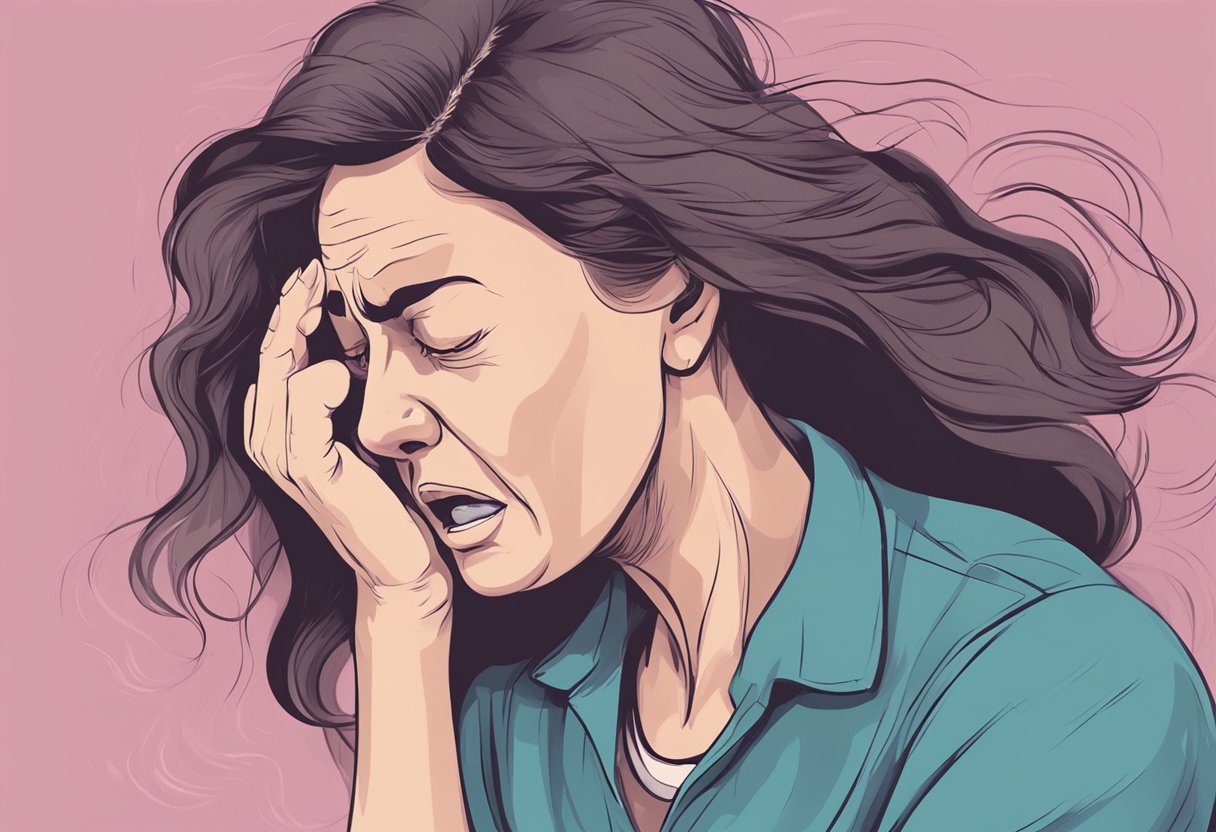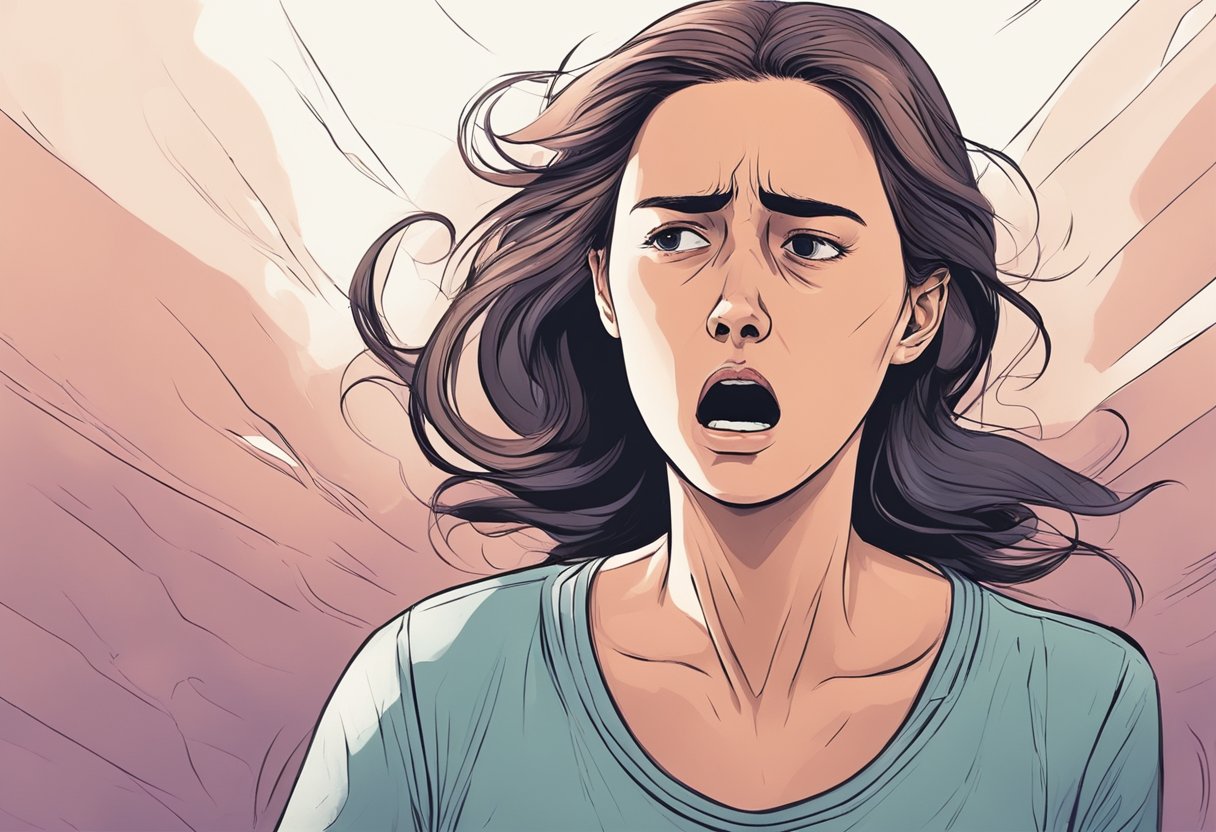Explore the link between menopause and panic disorder with expert insights. Learn about symptoms, management strategies, and how to seek help confidently.
Table of Contents
Introduction – Menopause and Panic Disorder
Menopause marks a significant transition in a woman’s life, typically occurring in the late 40s to early 50s, an event defined by the end of menstrual cycles and a significant shift in hormone levels. These hormonal changes can lead to various physical and emotional symptoms, with some women experiencing mood swings, depression, and anxiety. Among the psychological challenges that can arise during this time is the occurrence of panic disorder—a type of anxiety disorder characterized by recurrent and unexpected panic attacks.

Panic disorder during menopause may manifest with symptoms like heart palpitations, sweating, trembling, and a sense of impending doom. The relationship between menopause and panic attacks highlights the intricate ways in which hormonal fluctuations can impact mental health. Fortunately, numerous ways to manage these symptoms include lifestyle changes, therapeutic interventions, medical treatments, and support strategies.
Key Takeaways
- Menopause can lead to hormonal changes that impact mental health, including the potential onset of panic disorder.
- Management of panic disorders during menopause may include lifestyle modifications and medical treatments.
- Understanding and support are crucial for coping with the intersection of menopause and panic disorder.
Menopause Overview

Menopause marks the end of a woman’s menstrual cycles. It’s important to understand this natural biological process and the hormonal changes that come with it, which can lead to various symptoms including mood swings and hot flashes.
Understanding Menopause
Menopause typically occurs in a woman’s 40s or 50s with the average age being 51 in the United States according to the Mayo Clinic. It is diagnosed after a woman has not had a menstrual period for 12 consecutive months. The transition to menopause, known as perimenopause, can last several years. During this time, women may experience irregular periods and other physical changes signaling that fertility is winding down.
Hormonal Changes and Symptoms
The fluctuation of two key hormones, estrogen and progesterone, triggers the symptoms associated with menopause. As these hormone levels decline, they can cause a range of symptoms, which include, but are not limited to, hot flashes, night sweats, trouble sleeping, and emotional changes like mood swings. Additionally, the reduced levels of estrogen are linked to changes in mood and anxiety, such as panic disorder.
| Key Findings | Related Keywords |
|---|---|
| The average age of menopause is 51 in the United States. | Menopause, period |
| Declining levels of estrogen and progesterone trigger symptoms. | Hormonal changes, symptoms |
| Hot flashes and mood swings are common symptoms. | Hot flashes, mood swings |
Understanding these symptoms and their relation to hormonal changes is crucial in managing the transition into menopause effectively.
Panic Disorder During Menopause

Menopause can be a challenging period for many women, during which they may experience an onset or increase in frequency of panic attacks. These occurrences have significant implications for mental health and well-being.
Connection Between Menopause and Panic Attacks
Panic attacks during menopause are often linked to hormonal changes. Fluctuating levels of estrogen may exacerbate symptoms of anxiety and panic, leading to panic disorder. The symptoms can be concentrated in episodes of intense fear and discomfort, frequently accompanied by heart palpitations, shortness of breath, and sweating. Research indicates that panic disorder might arise or be aggravated by these hormonal shifts, making menopause a critical period for psychological wellbeing.
Psychological Symptoms and Mental Health Impacts
The mental health impacts of panic disorder during menopause can extend beyond panic attacks. Sufferers might endure persistent stress, which can contribute to depression and a pervasive sense of anxiety. This state of continuous apprehension about potential panic attacks can severely affect daily functioning and quality of life. It’s also hypothesized that changes in neurotransmitters triggered by menopause might influence psychological symptoms, further complicating mental health during this phase.
| Key Findings | Related Keywords |
|---|---|
| Hormonal changes during menopause are connected to an increase in panic attacks and the development of panic disorder. | Menopause, Hormonal |
| An ongoing state of fear and anxiety about future panic attacks affects quality of life and daily activities. | Fear, Quality of life |
For more detailed information on the topic please refer the following articles:
| Related Article | URL |
|---|---|
| Menopause and panic attacks: Exploring the hormonal link and management strategies | Menopause and Panic Disorder |
| The impact of menopause on psychological symptoms and how to cope with panic attacks | Managing Menopausal Mood Swings |
Lifestyle and Therapeutic Interventions

This section explores effective lifestyle modifications and therapeutic techniques available for managing symptoms associated with menopause and panic disorders. It focuses on diet, physical activity, and psychological interventions, including relaxation and cognitive-behavioral therapy.
Diet and Physical Activity
A balanced diet and regular exercise are fundamental in managing menopausal symptoms and panic disorders. Reducing caffeine and alcohol intake, along with quitting smoking, can greatly diminish the risk of panic attacks. Incorporating foods rich in phytoestrogens and maintaining a diet with regulated blood sugar levels also play a pivotal role in symptom management. Conversely, engaging in physical activities such as yoga can enhance mood stability and reduce anxiety.
| Key Intervention | Description | Source URL |
|---|---|---|
| Diet | Low caffeine and alcohol, rich in phytoestrogens | Menopause and Panic Attacks |
| Exercise | Regular activities, including yoga | Menopause and Anxiety |
Psychotherapy and Relaxation Techniques
Cognitive-behavioral therapy (CBT) is an effective treatment for panic disorder, including during the menopausal transition. It helps individuals identify and challenge distressing thought patterns. Relaxation techniques, such as meditation and deep breathing exercises, can help reduce overall stress levels and mitigate panic attacks. Consistent practice of these techniques can improve coping mechanisms during menopause.
| Key Therapy | Application | Source URL |
|---|---|---|
| CBT | Addressing and managing negative thought patterns | Menopause and Panic Attacks |
| Relaxation Techniques | Reducing stress and anxiety symptoms | Strategies to cope with stress and anxiety |
Medical Treatments and Medications

In addressing panic disorder during menopause, patients and healthcare providers often consider medical interventions. These can range from hormone therapy to various pharmacological options, including antidepressants and anti-anxiety medication.
Hormone Therapy
Hormone therapy is considered as a potential treatment for panic disorder symptoms that may arise during menopause. Estrogen, in particular, can help mitigate some symptoms by stabilizing hormonal fluctuations that contribute to panic attacks. However, hormone therapy is not without risks and should be discussed with a healthcare professional.
Pharmacological Options
Beyond hormone therapy, several medications play a critical role in treating panic disorder in menopausal women. Antidepressants, such as Selective Serotonin Reuptake Inhibitors (SSRIs), and certain anti-anxiety medications can provide relief. It is essential for patients to understand the potential side effects and to work closely with their healthcare provider to monitor the effectiveness of any medication.
| Entity | Treatment Type | Key Finding | Source |
|---|---|---|---|
| Antidepressants | Pharmacological Options | Selective serotonin reuptake inhibitors (SSRIs) are typically prescribed to treat panic attacks and anxiety during menopause. | Menopause and Panic Attacks |
| Anti-anxiety Medication | Pharmacological Options | These medications may help reduce the intensity of panic attacks but should be used under strict medical supervision due to the risk of dependency. | Panic Disorder Treatments during Menopause |
| Hormone therapy | Therapy | Hormone therapy involves the administration of estrogen or a combination of estrogen and progesterone to alleviate menopausal symptoms, including those that may trigger panic attacks. | Menopause and Anxiety: What’s the Link? |
Each treatment option should be personalized based on the individual’s health profile and the severity of their symptoms.
Support and Management Strategies

Effective management of panic disorder during menopause requires a multidimensional approach, focusing on building a robust support system and understanding specific triggers to mitigate stress.
Building a Support System
Relationships play a crucial role in offering support during menopause, a period often accompanied by emotional upheavals such as panic disorder. Establishing a strong network including friends, family, and support groups can provide the necessary emotional backing. Access to psychotherapy can also significantly aid in handling stress linked to menopause.
Understanding and Managing Triggers
Identifying triggers is a critical step in managing panic disorder. It involves being aware of situations or stressors that exacerbate panic attacks during menopause. Documenting these incidents in a diary or through professional help, such as psychotherapy, can reveal patterns, enabling better management strategies to be put in place.
| Key Strategies | Description | Source URLs |
|---|---|---|
| Lifestyle Modifications | Making lifestyle changes like exercising and engaging in hobbies to relieve menopause-related stress. | Menopause Network |
| Dietary Adjustments | Incorporating specific dietary changes to reduce symptoms of panic disorder. | Menopause Now Treatments |
| Relaxation Techniques | Practicing relaxation techniques to mitigate triggers and manage stress. | Damiva Blog |
| Document Triggers | Keeping a diary to note down specific panic attack triggers and coping strategies during menopause. | HealthyWomen |
| Professional Support – Psychotherapy | Engaging with a therapist for personalized coping strategies against panic disorder. | Psych Central |
To manage triggers effectively, one may:
- Recognize and avoid situations that cause anxiety when possible.
- Develop coping mechanisms involving relaxation techniques, such as deep breathing or meditation.
- Consider lifestyle changes with an emphasis on physical activity and social engagement.
- Engage regularly with a healthcare provider or support group to discuss and strategize on managing menopause-related panic disorder.
It is essential that individuals tailor their management plan to their specific needs, as each person’s experience with panic disorder during menopause is different.
Prevention and Proactive Measures
Preventive measures and early symptom recognition can be impactful for those navigating through menopause and attempting to manage or mitigate panic attacks. Focusing on lifestyle modifications and recognizing the early signs can play a pivotal role in prevention.
Recognizing Early Symptoms
Being vigilant about early symptoms is crucial in preventing full-blown panic attacks. Symptoms to watch for include sudden and intense spikes in anxiety, heart palpitations, and an overwhelming sense of dread or fear. Documenting these symptoms and discussing them with a healthcare provider is advisable, which can help in early intervention and management.
Incorporating Preventive Lifestyle Changes
Incorporating specific lifestyle changes can significantly benefit individuals looking to prevent panic attacks during menopause. Regular exercise and maintaining a consistent sleep schedule contribute to overall well-being and reduce vulnerability to anxiety. Additionally, a balanced diet can stabilize mood fluctuations. Practices such as breathing techniques, relaxation techniques, and progressive muscle relaxation can be useful tools for stress management.
| Lifestyle Change | Benefit | Source |
|---|---|---|
| Regular Exercise | Enhances mood, improves sleep | Menopause Now |
| Consistent Sleep | Reduces stress, prevents mood swings | Healthy Women |
| Balanced Diet | Sustains energy levels, supports hormonal balance | Menopause and Panic Attacks |
| Breathing Techniques | Decreases immediate anxiety | Menopause.sg |
In summary, maintaining a healthy lifestyle and being attuned to the body’s signals are imperative steps in mitigating the risk of panic disorders during menopause.
Frequently Asked Questions
This section addresses specific concerns about panic attacks and anxiety management during the menopause transition.
What are common panic attack symptoms during menopause?
During menopause, individuals may experience symptoms such as sweating, a racing heart, nausea, and a sense of impending doom. Feelings of detachment and loss of control are also common. For more detailed information on menopausal panic attacks, one can read about the connection at HealthyWomen.
Which treatments are effective for panic attacks in perimenopausal women?
Treatments for panic attacks in perimenopausal women often include cognitive-behavioral therapy (CBT) and sometimes medication. Lifestyle changes, such as regular exercise and stress management techniques, can also be beneficial. Readers can find further insights about treatments at Verywell Health.
How can anxiety be managed naturally during menopause?
Natural management of anxiety during menopause may include mindfulness meditation, yoga, or acupuncture. Regular physical activity and maintaining a healthy diet are also supportive measures. For an overview of natural anxiety management strategies during this time, visit Healthline.
Are there medication options specifically for anxiety due to menopause?
There are medications available that can help manage anxiety symptoms caused by menopause. These may include antidepressants or hormonal therapy, depending on individual needs. For specific medicinal options related to menopause-induced anxiety, see information provided by the Cleveland Clinic.
What is the link between night-time panic attacks and menopause?
Night-time panic attacks during menopause are often linked to hormonal changes that can affect sleep patterns and exacerbate anxiety. These hormonal fluctuations can disrupt the sleep cycle, potentially leading to panic attacks at night. To explore more on this topic, consider reading the report from This Is Perimenopause.
How long is anxiety related to menopause expected to last?
Anxiety related to menopause can vary in duration, often depending on individual factors such as lifestyle, overall health, and the nature of symptoms. Some individuals may experience anxiety for the duration of the menopause transition, while others may notice a decrease in symptoms after this phase ends.
| Key Findings | Related Keywords | Sources |
|---|---|---|
| Menopause can cause panic attack symptoms like sweating and heart palpitations. | Menopause, panic attack symptoms | HealthyWomen |
| Treatments such as CBT and lifestyle changes can be effective for perimenopausal panic attacks. | Cognitive-behavioral therapy, perimenopause | Verywell Health |
| Natural management of menopause anxiety may involve meditation and regular exercise. | Natural anxiety management, menopause | Healthline |
| Medications for anxiety due to menopause range from antidepressants to hormone therapy. | Medication options, hormonal changes | Cleveland Clinic |
| Night-time panic attacks can be linked to hormonal fluctuations affecting sleep. | Night-time panic attacks, hormonal fluctuations | This Is Perimenopause |
| The duration of menopause-related anxiety varies by individual. | Anxiety duration, menopause transition | n/a |




